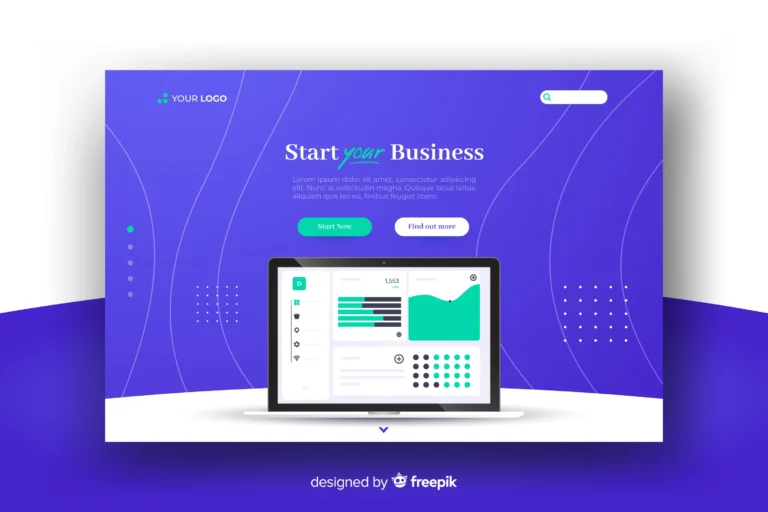ConvertKit vs MailChimp: Which One is Right for You?
ConvertKit is a good email marketing service with a wide range of marketing tools and capabilities. While it is one of the more expensive services available, its creator-focused features may be worth the cost. You can create a fully personalized marketing strategy that helps you grow and monetize your audience.
- I compared Mailchimp and ConvertKit and determined that ConvertKit was a better fit.
- I appreciated ConvertKit’s extensive feature set and the ability to tailor my email marketing campaign to my specific requirements.
- I found ConvertKit to be far more user-friendly than Mailchimp, and the support team responded quickly to any questions I had.
- I was also impressed by ConvertKit’s extensive integrations, which make it simple to connect with various platforms and services.
- Overall, I was very pleased with my ConvertKit campaigns’ conversion rates and customer feedback.
- Mailchimp isn’t as robust as competitors like Constant Contact, MailerLite, and AWeber. These latter options are more appropriate for advanced marketers and agencies. Mailchimp pricing can also spiral out of control as your campaign grows in size. All things considered, the alternatives we mentioned are a better deal.
- Overall, ConvertKit is a good email marketing service with a wide range of marketing tools and email capabilities. While it is one of the more expensive services available, its creator-focused features may be worth the cost.
- You can create a fully personalized marketing strategy that helps you grow and monetize your audience with its on-demand workshops, free migration services, and an entire creator community.
Mailchimp Review
Introduce Mailchimp and provide a brief overview of what it has to offer. Mailchimp is a marketing automation platform that helps businesses send marketing emails, create targeted campaigns, and track the performance of their email campaigns.
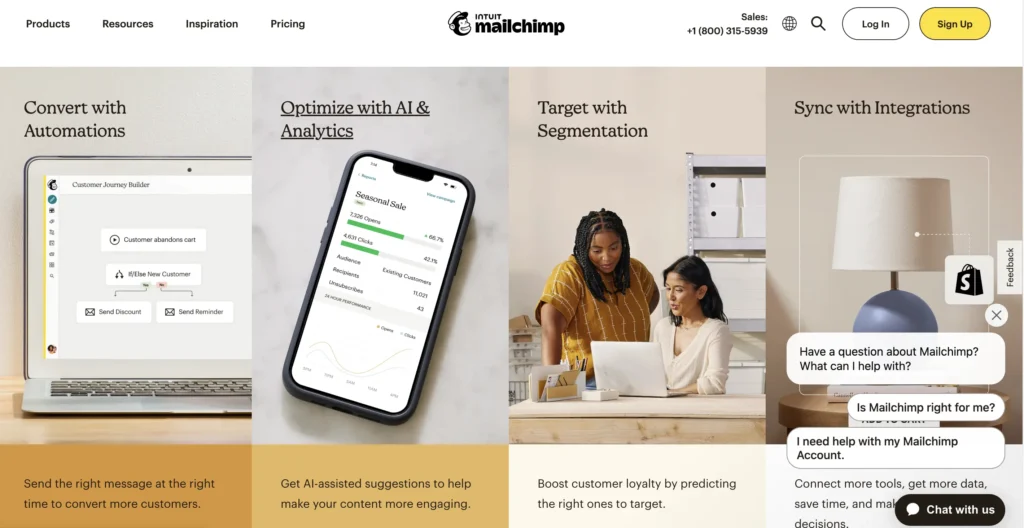
Thanks to its substantial marketing budget, Mailchimp has become one of the most well-known marketing automation platforms available. The platform recently launched a slew of e-commerce features and promises to increase accessibility for email marketing. The brand has definitely reinvented itself, so in this review, we decided to compare it to other market players.
Nonetheless, Mailchimp isn’t without merit. There are numerous reasons to be excited, including some of the most advanced reporting capabilities available on the market. The platform also has a plethora of integrations, is simple to use, and has modern, visually appealing email templates. As a result, we believe Mailchimp merits a review and comparison with popular alternatives from our top list.
You can find our top 10 list of the best email marketing services right here. We’ve spent a lot of time researching and testing the best email marketing services, so you don’t have to.
Mailchimp: Pros and Cons
Mailchimp excels in some areas while falling short in others. We’ll go over what we like about the service and what could be improved.
Pros
1. Email Templates: Mailchimp has some of the most eye-catching email templates available. Start with one of Mailchimp’s pre-made templates and modify it to suit your needs. As an alternative, you can use one of the platform’s themes, which only requires you to add your text and send emails. Undoubtedly, the best option, if you want to project a professional image, is Mailchimp. Additionally, the platform supports a variety of email formats, including transactional emails, newsletters from the past, and autoresponders. Finally, you can determine which emails perform the best by using the platform’s respectable A/B testing feature.
2. One of the best entry-level email marketing platforms in terms of usability is Mailchimp. With a very user-friendly interface, it’s a great introduction to email marketing. The drag-and-drop email builder also makes it simple to create your first campaign.
The user interface is generally easy to comprehend and use. Additionally, you can create your campaigns from scratch without having any coding experience. Mailchimp also caters to more knowledgeable users. For instance, you can use the platform’s custom builder to develop a distinctive email template with your own HTML code.
3. AI-Powered Recommendations: To help you streamline your campaigns, the platform has cutting-edge artificial intelligence (AI) capabilities. For instance, Mailchimp can recognize your top-selling items or client preferences automatically. On the basis of these metrics, the platform then suggests the best content blocks. similar to how Mailchimp’s smart feature pinpoints and groups your high-value prospects and clients who are most likely to make another purchase from you. The software even offers practical recommendations for enhancing the performance of your campaign based on billions of relevant data points.
4. Advanced Reporting: With its robust reporting feature, Mailchimp outperforms the competition. You receive a straightforward visual reporting dashboard to quickly track the success of your campaign. The reports provide real-time coverage of all the important metrics, including open rate, bounce rate, click-through rate, and unsubscribe rate. Your landing pages’ and ads’ performance is also included in the reporting function. You can, for instance, keep track of the precise ROI, views, clicks, and customers acquired from your ads. Similar metrics, including clicks, views, revenue, and list signups, can be tracked for landing pages.
5. All-In-One Marketing Hub: As a result of a number of recent acquisitions, Mailchimp has significantly expanded the range of services and features it offers. The most notable acquisitions by Mailchimp were the AI content platform Inspector 6, the automated design platform Sawa, and the survey platform BigTeam. Due to these acquisitions, Mailchimp is now able to provide digital marketing capabilities that are not offered by traditional email marketing platforms. For instance, as a result of its merger with the two-way SMS platform Chatitive, Mailchimp now supports SMS marketing. Multi-channel campaigns, integrated CRM, personalized domains and hosting services, and a website builder are additional features of digital marketing.
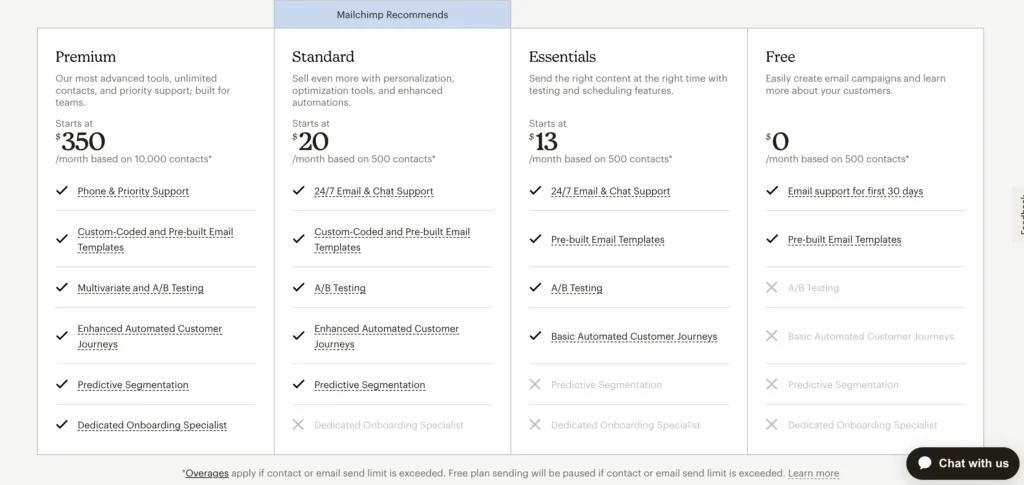
Cons
Once more, Mailchimp is far from ideal. Like every other email marketing service available, it has its flaws.
- Low-Level Automation: For introductory campaigns, Mailchimp provides enough automation. The platform includes the essentials, such as auto-replies, automating Google remarketing ads, automating email reminders for abandoned carts, and providing feedback. Once more, the available automation features are sufficient for your initial, modest campaign. On Mailchimp, there are many things you cannot automate. Important features like automated customer segmentation or removing individuals from a sequence are included in this. Because of this, Mailchimp’s automation is poor, especially when compared to leading competitors like MailerLite.
- Difficulty List management: Mailchimp puts an emphasis on simplicity. The popularity of the platform is a result of this strategy. However, it also has a weakness. In particular, managing your mailing list with Mailchimp is challenging. Siloed Mailchimp lists This implies that you are unable to manage between lists. Instead, to make the most of the service, you should make a single list. However, because Mailchimp’s segmentation feature is still in its infancy, this strategy restricts how effectively you can target audiences.
- Doesn’t Support Affiliate Marketing: For most people, this drawback isn’t a deal-breaker. It’s important to note, though, that Mailchimp fines affiliate marketers. According to the platform’s terms of service, affiliate marketing is not permitted. Technically, Mailchimp does occasionally permit affiliate links. Affiliate marketers would be better off using a different email marketing service because it is difficult to know which ones to use and how to benefit from them.
ConvertKit Review
ConvertKit is an all-in-one email marketing service and general marketing hub that helps creators of all kinds. ConvertKit’s extensive email marketing tools can help you grow and maintain your audience whether you’re an artist, author, or musician. Let’s look at the pros and cons to see if ConvertKit is the right service for you.
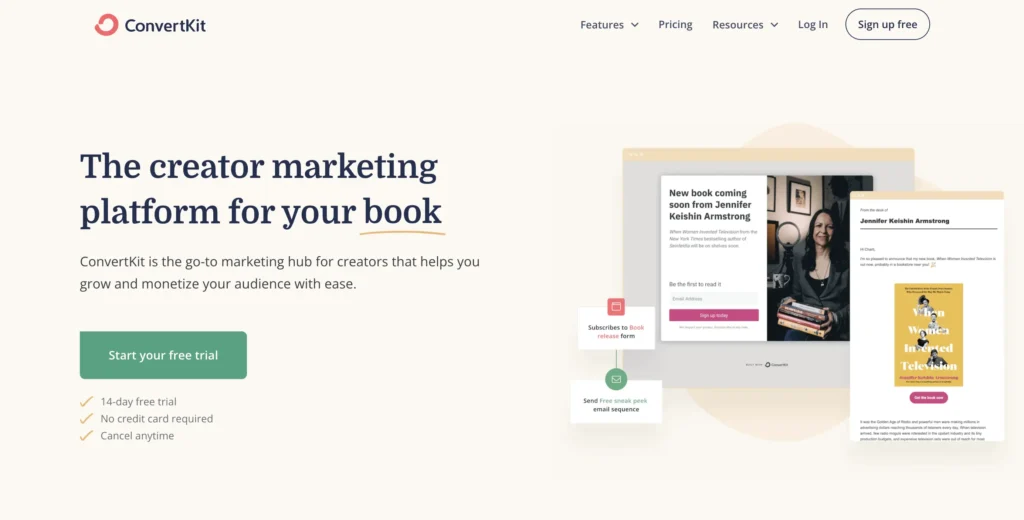
ConvertKit did not make our top 10 list when compared to other email marketing services on the market today. Many users, however, appreciate ConvertKit’s advanced email features and creator-focused support as an all-in-one email marketing solution. ConvertKit allows you to easily grow, engage, and monetize your audience.
ConvertKit Pros and Cons
There will be good and bad features to consider, as with all email marketing services. Following extensive research, we discovered that ConvertKit provides solid features that the majority of users are satisfied with. It does, however, have a few drawbacks. To help you decide, let’s take a deep dive into both ends of the spectrum.
Pros
Comprehensive Email Marketing Tools: ConvertKit’s best feature is its extensive email marketing tool library. With its email broadcasts and automation solutions, you can grow and connect with your audience on a more personal level. ConvertKit can also assist you in expanding your email list by providing sign-up forms and customizable landing pages.
ConvertKit eliminates the need to create a new email list each time you want to sell a product or launch a new project. ConvertKit provides distinct tags and segments to assist you in creating subscriber groups based on tags, custom form fields, or even location. Not only that, but ConvertKit also provides advanced automation solutions, such as automated email funnels for targeted content.
Advanced Creator Features: ConvertKit’s Creator Pro plan includes some of the most advanced features to help creators succeed in their fields. You can give your top customers the treatment they deserve while fine-tuning your insights to ensure no one misses an email with subscriber scoring and deliverability reporting. You can also use ConvertKit’s newsletter referral program to reward your subscribers. And while creating targeted Facebook ads can be time-consuming, ConvertKit allows you to sync custom audiences directly to Facebook, eliminating the need to spend hours building ad lists from scratch.
Simple Email Designer: If you need help writing compelling emails that also look beautiful and professional, ConvertKit’s intuitive email designer can assist you. This tool includes a simple email editing system that allows you to create email templates, add instant images, include clickable CTAs, and even code your entire email. Choose from a library of ConvertKit templates or create your own without writing a single line of code or HTML. There is also unlimited template space, and all templates can be adapted to any device. ConvertKit also allows you to customize your emails by adding headers, buttons, dividers, fonts, colors, alignments, and links.
ConvertKit provides a wide range of integrations if you want to expand your marketing efforts. ConvertKit offers some of the most popular apps for everything from eCommerce and lead capture to scheduling and CRM, including Monday.com, Stripe, Zapier, and Jetpack.
Customer Support: After reading dozens of ConvertKit user reviews, we discovered that many users are pleased with the company’s customer service team. According to one user, while customer service isn’t always quick, the team will do everything they can to help resolve the issue at hand. Another user mentioned that ConvertKit provides a wealth of supporting documentation, so contacting customer support isn’t always the best option for ConvertKit users.
ConvertKit not only has excellent customer service, but it also has a unique creator community for all ConvertKit members. The creator community functions similarly to a forum, allowing you to ask questions and receive answers from other creators, share courses and blogs, and even gain early access to feature updates. Quick tips, important announcements, creator news, feedback, and celebrations are also available.
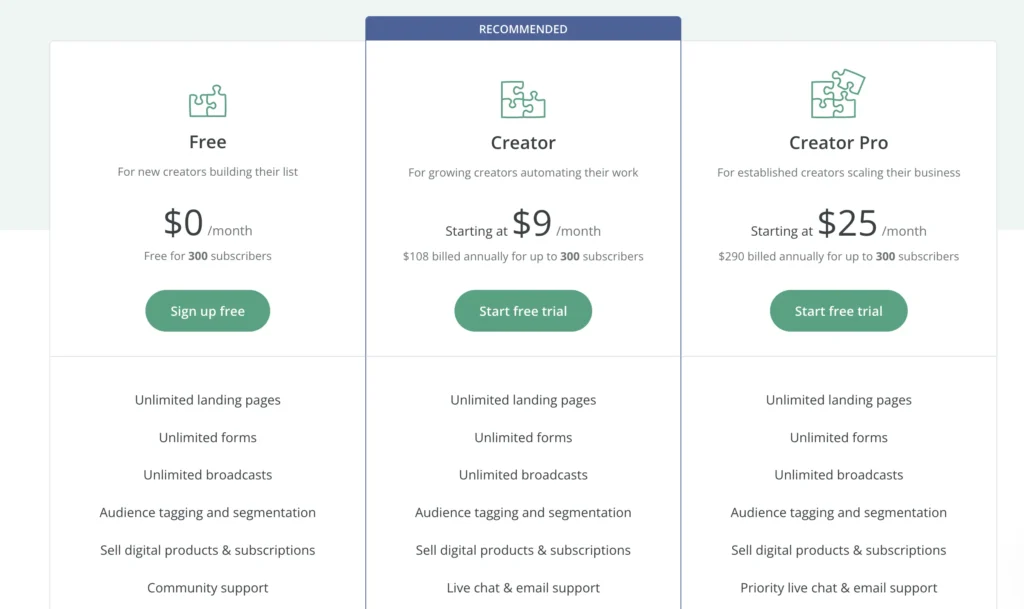
Cons
Poor Page Builder: After reviewing ConvertKit’s reviews, we discovered that the most consistent negative feedback was about its builder systems, specifically its page builder. Many users complained that ConvertKit’s page builder is difficult to use due to its slow and glitchy API. Some users even went so far as to suggest that you use another page builder or that it’s impossible to create a good landing page with ConvertKit’s system. Because landing pages are important components of an email marketing strategy, these reviews aren’t ideal.
Ineffective Scheduling: Email scheduling is an essential component of a successful marketing strategy—you don’t want to write and send out multiple emails every day. Unfortunately, a few users have complained that ConvertKit’s scheduling tool is ineffective and riddled with bugs. Because ConvertKit did not schedule their campaign, one user reported multiple delays with their email campaigns. Another user claimed that ConvertKit forced them to reschedule an email several times before it worked.
Expensive Pricing Model: ConvertKit is more expensive than most email marketing services on the market, and its pay-per-subscriber pricing model has caused some users to complain. ConvertKit’s pricing tiers become more expensive for the same features as your subscriber list grows.
What are ConvertKit and MailChimp?
ConvertKit and MailChimp are both email marketing platforms.
Comparison of ConvertKit and MailChimp?
– Both ConvertKit and MailChimp offer a variety of features to help you create and manage your email campaigns.
– Both platforms are easy to use, and both allow you to create and manage your campaigns from a single interface.
– However, ConvertKit offers more flexibility and customization options, while MailChimp is more affordable.
Which is right for your business?
– If you are looking for a more affordable email platform, MailChimp is definitely the right choice.
– However, if you want more flexibility and customization options, ConvertKit is the better option.
What are the key features of each platform?
ConvertKit and MailChimp are two popular email marketing platforms. They both have features that are helpful in promoting your business. However, there are some key differences between the two that should be considered when deciding which one is best for your business.
ConvertKit is a more complex platform than MailChimp. It has more features for advanced marketers. However, it is also more expensive. MailChimp is simpler and cheaper.
Both platforms have a number of key features that are helpful in promoting your business. ConvertKit has features for tracking conversions, mailing lists, and automated email marketing. MailChimp has features for creating beautiful newsletters, tracking subscribers, and sending automated emails.




